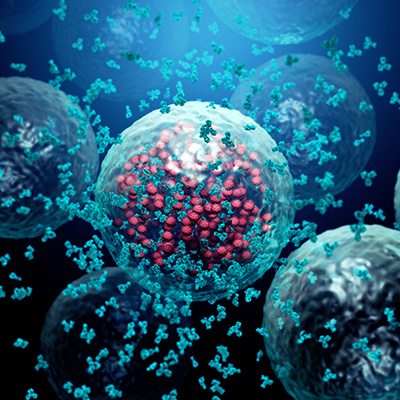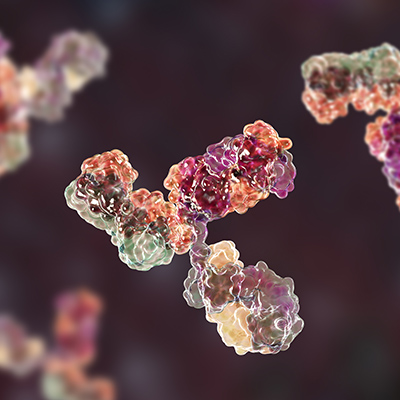October 12, 2020 -- Can antibodies developed against SARS-CoV during the 2003 outbreak be used to prevent infection by SARS-CoV-2? In an October 9 study published in Science Advances, researchers analyzed precious serum collected from convalescent SARS-CoV patients to find out.
SARS-CoV-2 is genetically close to SARS-CoV, which emerged in 2002. Like SARS-CoV and many other coronaviruses, SARS-CoV-2 utilizes its surface spike glycoprotein to gain entry into host cells. Each unit of the spike trimer contains an S1 and S2 subunit, with the N-terminal S1 subunit binding to cellular receptor angiotensin-converting enzyme 2 (ACE2) through an internal receptor-binding domain (RBD).
SARS-CoV-2 and SARS-CoV share around 80% homology in full-length genome sequences, and the spike proteins share about 76% amino acid identity. Moreover, the RBD sequences are only around 74% identical, with most mutations occurring in the RBD region. These changes in the SARS-CoV-2 RBD have led to 10- to 20-fold higher ACE2 binding affinity compared to SARS-CoV, which could explain the higher transmissibility of SARS-CoV-2.
Structure determination has previously revealed that SARS-CoV-2 RBD binds ACE2 in the same orientation as the SARS-CoV RBD and relies on conserved, mostly aromatic, residues. This suggests that the mechanism of infection is conserved among Coronaviridae.
During the 2003 outbreak of SARS-CoV, researchers began development of vaccines and neutralizing antibodies that target the SARS-CoV RBD. In this paper, a group of Chinese researchers sought to explore the antigenic cross-reactivity between SARS-CoV-2 and SARS-CoV.
The researchers, who were directly involved in studies conducted during the 2003 outbreak, evaluated immune sera collected from 20 recovered SARS-CoV patients that were enrolled in a SARS-CoV follow-up study at the Peking Union Medical College Hospital, Beijing. The samples were collected three to six months after discharge and stored in aliquots at -80°C.
All of these patients displayed high titers of antibodies against the S1 subunit and RBD proteins of SARS-CoV and cross-reacted strongly with the spike protein of SARS-CoV-2. However, they found that each serum sample had lower efficiency in inhibiting SARS-CoV-2 compared to SARS-CoV. Specifically, the patient samples had higher reactivity with the S2 subunit of SARS-CoV-2 relative to the S1 subunit and RBD protein.
When developing vaccines and therapies that are effective against multiple strains of coronaviruses, it is important to test each candidates' cross-reactivity potential. The literature and evidence available for polyclonal antibodies from various immunized animals is inconsistent. Some studies suggested that SARS-CoV RBD antibodies could be used to develop a vaccine that is effective against both SARS-CoV and SARS-CoV-2, while other evidence points to the inability of SARS-CoV-derived antibodies to neutralize SARS-CoV-2 infection.
Using a pseduovirus-based neutralization assay, the researchers tested panels of antisera against SARS-CoV spike and RBD proteins for their ability to cross-react and cross-neutralize SARS-CoV and SARS-CoV-2. They found that RBD proteins derived from different SARS-CoV strains can elicit antibodies with unique functionalities. Some proteins derived from palm civet SARS-CoV induced antibodies capable of blocking the RBD-receptor binding, while others derived from human strains did not. Verification in a mouse model immunized with RBD-Fc fusion protein encoding the palm civet SARS-CoV strain found that the sera cross-reacted well with the spike protein of SARS-CoV-2, suggesting that SARS-CoV and SARS-CoV-2 share conserved epitopes in their respective RBD sites.
According to the authors, these results prompt interesting questions for future research including:
- Whether individuals who recovered from previous SARS-CoV infection can recall immunity against SARS-CoV-2
- Whether a universal vaccine can be rationally designed by engineering the spike protein RBD sequences
They also noted that although antibody-dependent enhancement (when antibody binding to a virus actually eases its entry into host cells) was not observed in this study, the effect should be addressed in current and future vaccine development efforts.
Do you have a unique perspective on your research related to virology or vaccine development? Contact the editor today to learn more.
Copyright © 2020 scienceboard.net





